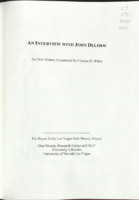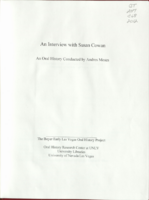Search the Special Collections and Archives Portal
Search Results

Transcript of interview with Ed Collins by Steve Smith, March 15, 1981.
Date
1981-03-15
Archival Collection
Description
On March 15, 1981, Steven L. Smith interviewed Edward A. Collins (born on March 16th, 1930, in Chicago, Illinois), at the Dunes Hotel and Country Club. Collins relocated to Nevada in 1955. The interview covers gender equality in the field of culinary arts in Las Vegas. Collins describes the changes he saw take place in culinary over the years. He also discusses Bugsy Siegel’s impact and influence on the emergence of big shows in the hotels on the Strip. Among other jobs, Collins worked as a captain in a showroom at the Frontier Hotel. He discusses Las Vegas before and after Howard Hughes and Bob Maheu appeared on the scene.
Text

Transcript of interview with Joseph Delaney by Carol Hunter, October 24, 1979
Date
1979-10-24
Archival Collection
Description
Carol Hunter interviewed columnist and former music consultant Joseph “Joe” Delaney (b. 1922 in Philadelphia, Pennsylvania) on October 24, 1979 about his experiences in the entertainment industry of Las Vegas, Nevada. The interview begins with Delaney’s recollection of how Las Vegas looked when he first moved to the city in 1961. Delaney mentions some of the businesses and hotels that were popular at the time, including the entertainers that performed at many of those hotels. He then describes the evolution of piano bars to lounge acts to showroom performances in the hotels, as well as the types of changes made for admission to those performances as corporations took control over Strip properties. Delaney also provides insight into the intricacies of the agreements between the properties and various entertainers for their residencies, and he mentions many of the particular entertainers of the time throughout the interview. Delaney additionally discusses his original experiences in talk
Text

Transcript of interview with John J. Delibos by Claytee D. White, October 2, 2012
Date
2012-10-02
Archival Collection
Description
With roots in Sheboygan, Wisconsin, John J. Delibos epitomizes a true Las Vegan. At the age of eight, his family moved from Wisconsin to Las Vegas to take advantage of emerging employment opportunities. Raised in a devout Catholic household, his mother and father demonstrated a strong work ethic that John would emulate. After graduating from Cornell University, John returns to Las Vegas. Over the course of his young adulthood, John meets many of Las Vegas' key developers, including the McKellars, the Boyds, and the Thomases. He works in various capacities, in various casinos around town. Eventually, John retires from gaming and works full-time as an interior designer, a skill he cultivated since childhood. Throughout the interview, John recollects, with meticulous detail, the development of Las Vegas since the 1960s, neighborhood by neighborhood, street by street, property by property. John now lives at Turnberry, overlooking a very different Las Vegas than that which he first saw as a child living at The DeVille.
Text

Transcript of Interview with Merna Dennison by Ken Pyatt, March 1, 1980
Date
1980-03-01
Archival Collection
Description
On March 1, 1980, Ken Pyatt interviewed his grandmother, Merna Dennison (born September 9th, 1917 in Blanding, Utah) in her home in Henderson, Nevada. During the interview, Merna pinpoints Cashman Field as a landmark of Las Vegas. She recalls the Helldorado Parade as one of Nevada’s biggest annual celebrations in which her family attended and participated on numerous occasions. She mentions serving on the Clark County School Board and discusses the growth of the city of Las Vegas, particularly the development and expansion of both McCarran Airport and the Strip.
Text

Transcript of interview with Frank Cope by Marianne Johnson, March 15, 1978
Date
1978-03-15
Archival Collection
Description
On March 15, 1978, Marianne Johnson interviewed Frank Cope (born in Kansas, in 1930) at his home in Las Vegas, Nevada. Frank’s family relocated to Nevada from Kansas when he was six months old. For school, he attended the Westside Grammar School, Las Vegas Grammar School on Fifth Street, and Las Vegas High School. He also attended Carson City High School for two years before enlisting in the Army and going overseas. Pertaining to work, Mr. Cope describes his occupation as distribution superintendent at the Las Vegas Valley Water District. He recalls how he met his wife, who also works for the water district as a secretary in the engineering department. Additionally, most of Frank’s brothers work for the water district as well. Social groups or organizations Frank mentions being affiliated with include the Las Vegas Golf Association, two motorcycle clubs, the American Public Works Association, the American Water Works Association, and the Las Vegas Elks Lodge 1468.
Text

Transcript of interview with Margie Joanne Corderman by Leora Cohen, March 11, 1981
Date
1981-03-11
Archival Collection
Description
On March 11, 1981, Leora Cohen interviewed city planner, Margie Joanne Corderman (born September 30th, 1933 in Sac City, Iowa) in the kitchen of her home in Boulder City, Nevada. The interview covers the history, growth and development of Boulder City. During the interview, Margie discusses Six Companies houses, swamp coolers, pollution and Boulder City locals having to commute to Las Vegas and Henderson for work. Some of the occupations Margie has held in Clark County, Nevada, include, Clark County Deputy Assessor, engineering aid, planning technician, planning director, and engineering technician.
Text

Transcript of interview with Susan Cowan by Andres Moses, January 31, 2006
Date
2006-01-31
Archival Collection
Description
Susan Cowan grew up in Kansas City, Missouri, and enjoyed a loving childhood with her parents, older sister and grandparents, complete with family vacations to California and Mexico. Called to dancing ever since she can remember, this passion remained with her throughout her life. By the time Susan graduated from high school, she had moved five different times. This nomadic nature continued once being married and having two children, eventually settling in Boulder, Colorado. It was here that Susan began working in higher education, as a secretary at the University of Colorado-Boulder, where she met her second husband. During her 19 years at UC-Boulder, Susan advanced in her career, becoming the lead administrator for the Chemistry Department. It was also here that Susan took dance classes again, with some of the best in the field. Susan and her husband moved to Las Vegas after nearly 25 years in Boulder, where she quickly found a community to express herself in dance.
Text

Transcript of interview with Suzette Cox by Andrew Lazarus, March 15, 1981
Date
1981-03-15
Archival Collection
Description
On March 15, 1981, Andrew Lazarus interviewed Suzette Cox (b. 1945 in San Diego, California) about her experiences of living in Las Vegas, Nevada. Cox talks briefly about her move from California to Las Vegas, her employment at two police agencies and a local newspaper company, and her family. The two also discuss racial discrimination issues in Las Vegas and Cox’s experiences in sports as she was going to school in Las Vegas. Cox later describes how the Strip influenced her life and move to the city, the crime rate in Las Vegas and Nevada and how it related to tourism, and her recollection of the effects of the above-ground atomic testing.
Text

Transcript of interview with Suzette Cox by Lance Cooper, March 1, 1979
Date
1979-03-01
Archival Collection
Description
On March 1, 1979, Lance Cooper interviewed Suzette Cox (b. 1945 in San Diego, California) about her experiences living in Las Vegas, Nevada. Cox talks briefly about her career history in working at the Las Vegas Sun, as a deputy sheriff, and eventually as a secretary at the University of Nevada, Las Vegas. She also talks about the various parts of Las Vegas in which she has lived since moving to the city in 1953. The two also discuss the Las Vegas Strip, gambling, recreational activities, atomic testing, the Mormon Fort, and how Las Vegas has changed over the years.
Text

Transcript of interview with Nancy Craddock by George Apfel, March 13, 1976
Date
1976-03-13
Archival Collection
Description
On March 13, 1976, George Apfel interviewed Nancy Craddock (born 1922 in Anaheim, California) at her home about her experiences of living in Las Vegas, Nevada. Craddock begins by discussing her move from San Diego to Nellis Air Force Base with her husband in the 1950s and their eventual move to the Twin Lakes area, at which they had their home built. She provides details about living in this area, such as the recreational activities of her children and the neighbors who lived on the same street, one of whom was a mayor of Las Vegas, Oran K. Gragson. Craddock, a medical laboratory technician, also talks briefly about her experiences while working at Sunrise Hospital, and she later describes how properties operated on the Las Vegas Strip in its early days. The interview concludes with Craddock’s knowledge on the early pioneers of Las Vegas, the formation of the university’s library, and the social conditions during the 1950s compared to those at the time of the interview.
Text
Pagination
Refine my results
Content Type
Creator or Contributor
Subject
Archival Collection
Digital Project
Resource Type
Year
Material Type
Place
Language
Records Classification
